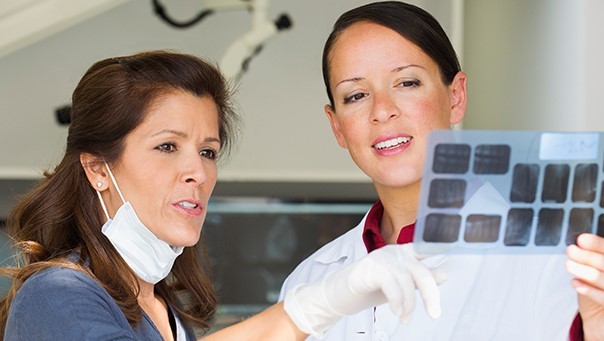-
-

BRUSHING & FLOSSING
How to BrushWhat Is the Right Way to Brush?
Proper brushing takes at least two minutes — that's right, 120 seconds!...

BRUSHING & FLOSSING
How To FlossWhat is the Right Way to Floss?
Proper flossing removes plaque and food particles in places where a toothbrush cannot easily reach... -
Science & Innovation
- Home
- Oral Health
- Repairing Poorly Fitting, Damaged or Broken Dentures


When dentures (false teeth) break or don't fit quite right, the best solution is to visit your dentist. Dentures may look natural, but they do not respond to changes in the shape of your mouth and may have to be adjusted by your dentist or a prosthodontist. Caring for dentures incorrectly can also damage them, which is why it's important to consider the following information.
Maintaining dentures
Careful daily maintenance keeps dentures from becoming damaged, which may weaken their structure and increases the risk that they'll break if you drop them on a hard surface. Dentures should be removed from the mouth and cleaned once per day, usually at night. Be sure to do this over a towel or a sink full of water to avoid similar breakage or damage if they slip out of your hands. After rinsing your dentures in cool, clean water, brush them with a soft-bristled toothbrush and place them in a denture cleaning solution overnight. Try not to let your dentures dry out, as this can make them brittle and change their shape so they no longer fit properly.
Poorly fitting dentures
The bone and gum tissue supporting your dentures can change shape over time, and this can cause dentures to become loose or ill-fitting. Your dentist will even see signs that your dentures don't fit well at a check-up appointment, or you may notice yourself that the dentures feel loose. If your gums are irritated, or you have difficulty chewing, see your dentist. They may be able to fix the problem by relining, rebasing or remaking the denture entirely. Dental News explains that relining is when a new resin material is applied to the base of the dentures, whereas rebasing involves replacing the denture base material with a new one. Alternatively, your dentist may decide to remake the dentures with both a new base and new set of teeth.
Broken or damaged dentures
Dentures don't break or become damaged only when dropped on hard surfaces; they can also succumb to general wear and tear. Care must be taken to avoid breaking delicate partial dentures, including avoiding undue heavy biting on individual front teeth.
Keep in mind that only a dentist or prosthodontist can fix damaged or broken dentures. Attempting to fix them yourself can be dangerous to your health, and it can damage them beyond repair. Fixing dentures incorrectly can be hazardous resulting in irritation and mouth sores that need additional oral maintenance on your part. A dentist or prosthodontist may be able to fix simple damage within a day, but a complicated repair may require sending the dentures to a dental lab.
Implant-retained dentures
According to the Health Direct Australia, implant-retained dentures are fitted through implants in your jaw; they may have complications including loosening of the denture. Clenching or grinding the teeth, along with an uneven fitting at the outset, make implant-retained dentures more likely to loosen.
It may be tempting to try to fix your poorly fitted, damaged or broken dentures yourself, but only a dentist or prosthodontist has the skill, dental materials and experience to repair them. It may seem convenient, but sorting them out yourself can be more harmful to your oral health than it's worth. Plus, a dental visit takes only a short time to provide a long-term, effective solution.
Related Articles

If you have been experiencing problems with a tooth, you may wonder, "Do I need a root canal filling?" Root canal fillings, also known as endodontic therapy, are performed when the nerve or pulp of the tooth becomes infected

When people are told that they need a root canal therapy, they often worry that it's going to be painful.

The goal of the root canal therapy is to save a tooth that is severely infected. As Dental Health Services Victoria puts it, a dentist performs the procedure to replace damaged or infected pulp in the tooth's root canal with a root filling.
This article is intended to promote understanding of and knowledge about general oral health topics. It is not intended to be a substitute for professional advice, diagnosis or treatment. Always seek the advice of your dentist or other qualified healthcare provider with any questions you may have regarding a medical condition or treatment.
Related Products

Helping dental professionals
More professionals across the world trust Colgate. Find resources, products, and information to give your patients a healthier future








